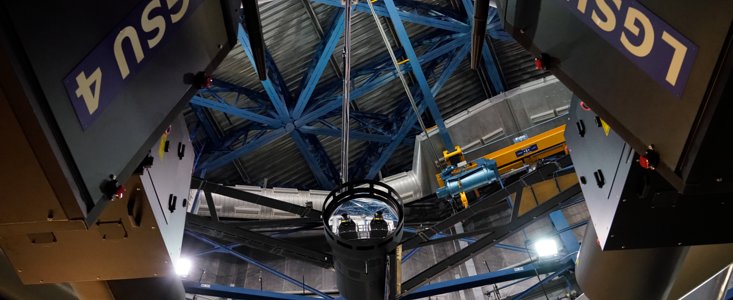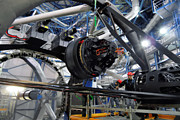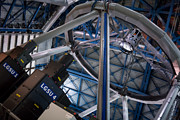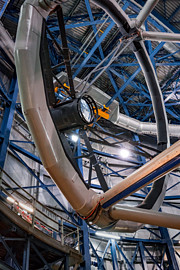Anuncio
Primera luz para el más grande sistema de óptica adaptativa
La Unidad de Telescopio 4 da un paso decisivo para lograr plenamente el sistema de óptica adaptativa
28 de Octubre de 2016
Se ha alcanzado un importante hito en el proyecto para transformar la Unidad de Telescopio 4 (Yepun) del Very Large Telescope de ESO (VLT), en un telescopio totalmente adaptativo, con la instalación de un espejo secundario deformable en el telescopio.
Los sistemas de óptica adaptativa compensan el efecto borroso causado por la atmósfera terrestre que degrada la nitidez de las imágenes obtenidas con los telescopios, inclusive con un telescopio de la magnitud y sofisticación del VLT. La instalación del nuevo sistema de Óptica Adaptativa (AOF) como una parte integral de UT4 permitirá al telescopio obtener imágenes aún más nítidas.
El espejo secundario deformable consiste en un espejo flexible de 2.2mm de espesor, montado sobre un sistema que contiene 1170 actuadores que permiten cambiar la forma del espejo para corregir los efectos causados por la turbulencia de la atmósfera. Con poco más de un metro de diámetro, es el mayor espejo para óptica adaptativa que jamás se haya producido. El espejo deformable ha requerido tecnología de vanguardia y la trayectoria de su desarrollo comenzó hace varios años. La construcción de la “óptica de referencia”, esencialmente el soporte del espejo, se terminó en el año 2010, y la primera versión del delgado espejo se entregó a la Sede Central de ESO en Garching, a fines del 2011, prosiguiendo con una versión perfeccionada en el 2014. Luego de extensos controles de rendimiento realizados en Garching, el montaje del espejo secundario deformable se envió a Chile y ha sido montado en el telescopio Yepun de 8,2 metros de diámetro.
Recientemente se ha realizado la alineación óptica y se ha sometido al espejo deformable a diversas pruebas, en modo rígido y montado en el telescopio, las cuales ha superado con éxito.
Además de reemplazar el espejo secundario convencional del telescopio con este nuevo espejo secundario, el Sistema de Óptica Adaptativa también incluye el Four Laser Guide Star Facility (4LGSF), cuya primera luz se realizó en abril del 2016, como también la instalación de módulos de óptica adaptativa en diversos focos del espejo secundario. Los módulos de óptica adaptativa son GRAAL (GRound laser Adaptive optics Assisted by Lasers), que alimentan imágenes corregidas a los instrumentos HAWK-I y GALACSI (Ground Atmospheric Layer Adaptive Corrector for Spectroscopic Imaging), que filtran imágenes para el espectrógrafo MUSE.
Se han desarrollado, asimismo, otras herramientas adicionales para optimizar la operación del Sistema AOF que ya están en funcionamiento. Ellas incluyen el software denominado Astronomical Site Monitor, que monitorea la atmósfera para determinar la altitud en que ocurren las turbulencias, y el sistema de Control de Tráfico Láser, que impide que los rayos del sistema 4LGSF interfieran con aeronaves o telescopios espaciales.
Con el advenimiento del Sistema AOF, el VLT continuará expandiendo su listado de resultados científicos de categoría mundial, y la experiencia con el sistema de Paranal servirá para superar los desafíos técnicos que plantea el próximo gran proyecto de ESO: la construcción del European Extremely Large Telescope.
Enlaces
Contactos
Robin Arsenault
ESOGarching bei München, Alemania
Tel: +49 89 3200 6524
Correo electrónico: rarsenau@eso.org
Peter Grimley
ESO, Assistant Public Information Officer
Garching bei München, Alemania
Tel: +49 89 3200 6383
Email: pgrimley@eso.org
Sobre el anuncio
| Identificador: | ann16078 |
Our use of Cookies
We use cookies that are essential for accessing our websites and using our services. We also use cookies to analyse, measure and improve our websites’ performance, to enable content sharing via social media and to display media content hosted on third-party platforms.
ESO Cookies Policy
The European Organisation for Astronomical Research in the Southern Hemisphere (ESO) is the pre-eminent intergovernmental science and technology organisation in astronomy. It carries out an ambitious programme focused on the design, construction and operation of powerful ground-based observing facilities for astronomy.
This Cookies Policy is intended to provide clarity by outlining the cookies used on the ESO public websites, their functions, the options you have for controlling them, and the ways you can contact us for additional details.
What are cookies?
Cookies are small pieces of data stored on your device by websites you visit. They serve various purposes, such as remembering login credentials and preferences and enhance your browsing experience.
Categories of cookies we use
Essential cookies (always active): These cookies are strictly necessary for the proper functioning of our website. Without these cookies, the website cannot operate correctly, and certain services, such as logging in or accessing secure areas, may not be available; because they are essential for the website’s operation, they cannot be disabled.
Functional Cookies: These cookies enhance your browsing experience by enabling additional features and personalization, such as remembering your preferences and settings. While not strictly necessary for the website to function, they improve usability and convenience; these cookies are only placed if you provide your consent.
Analytics cookies: These cookies collect information about how visitors interact with our website, such as which pages are visited most often and how users navigate the site. This data helps us improve website performance, optimize content, and enhance the user experience; these cookies are only placed if you provide your consent. We use the following analytics cookies.
Matomo Cookies:
This website uses Matomo (formerly Piwik), an open source software which enables the statistical analysis of website visits. Matomo uses cookies (text files) which are saved on your computer and which allow us to analyze how you use our website. The website user information generated by the cookies will only be saved on the servers of our IT Department. We use this information to analyze www.eso.org visits and to prepare reports on website activities. These data will not be disclosed to third parties.
On behalf of ESO, Matomo will use this information for the purpose of evaluating your use of the website, compiling reports on website activity and providing other services relating to website activity and internet usage.
Matomo cookies settings:
Additional Third-party cookies on ESO websites: some of our pages display content from external providers, e.g. YouTube.
Such third-party services are outside of ESO control and may, at any time, change their terms of service, use of cookies, etc.
YouTube: Some videos on the ESO website are embedded from ESO’s official YouTube channel. We have enabled YouTube’s privacy-enhanced mode, meaning that no cookies are set unless the user actively clicks on the video to play it. Additionally, in this mode, YouTube does not store any personally identifiable cookie data for embedded video playbacks. For more details, please refer to YouTube’s embedding videos information page.
Cookies can also be classified based on the following elements.
Regarding the domain, there are:
- First-party cookies, set by the website you are currently visiting. They are stored by the same domain that you are browsing and are used to enhance your experience on that site;
- Third-party cookies, set by a domain other than the one you are currently visiting.
As for their duration, cookies can be:
- Browser-session cookies, which are deleted when the user closes the browser;
- Stored cookies, which stay on the user's device for a predetermined period of time.
How to manage cookies
Cookie settings: You can modify your cookie choices for the ESO webpages at any time by clicking on the link Cookie settings at the bottom of any page.
In your browser: If you wish to delete cookies or instruct your browser to delete or block cookies by default, please visit the help pages of your browser:
Please be aware that if you delete or decline cookies, certain functionalities of our website may be not be available and your browsing experience may be affected.
You can set most browsers to prevent any cookies being placed on your device, but you may then have to manually adjust some preferences every time you visit a site/page. And some services and functionalities may not work properly at all (e.g. profile logging-in, shop check out).
Updates to the ESO Cookies Policy
The ESO Cookies Policy may be subject to future updates, which will be made available on this page.
Additional information
For any queries related to cookies, please contact: pdprATesoDOTorg.
As ESO public webpages are managed by our Department of Communication, your questions will be dealt with the support of the said Department.





